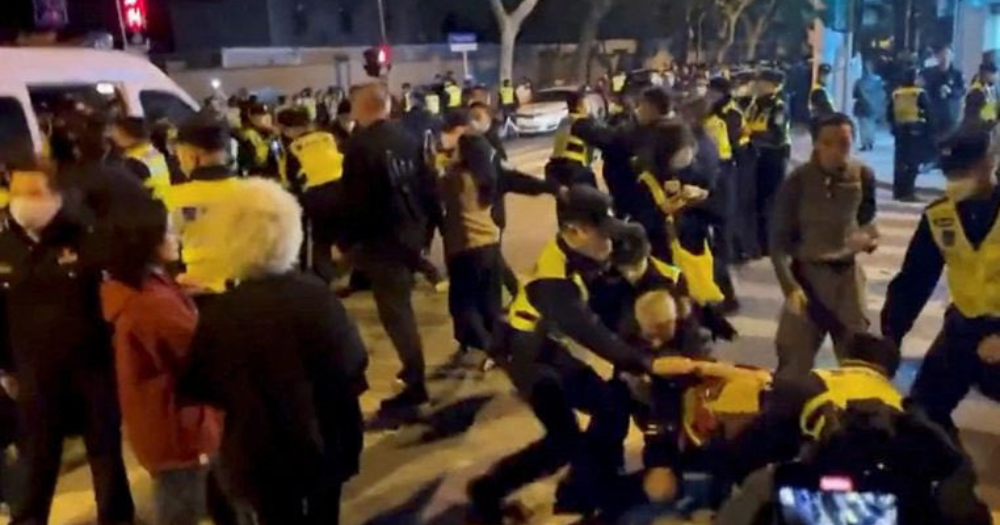Follow us on Telegram for the latest updates: https://t.me/mothershipsg
The Chinese government has blamed "forces with ulterior motives" for linking the fire in Urumqi to strict Covid-19 rules, AFP reports.
Chinese Foreign Ministry spokesperson Zhao Lijian said on Monday (Nov. 28), as reported by The New York Times, “On social media, there are forces with ulterior motives that relate this fire with the local response to Covid-19."
According to Reuters, when asked about widespread anger over China's zero-Covid policy, Zhao said that this "does not reflect what actually happened". He added that with the leadership of the Chinese Communist Party, as well as the cooperation from the Chinese people, the country's fight against Covid-19 will succeed.
Fire triggered rare protests
The protests were triggered by a fire in the Xinjiang city that killed 10 people and injured nine. Many questioned if the people were trapped in the building due to strict Covid lockdown measures, which might have hampered rescue as well. Videos found on social media reportedly showed fire trucks failing to get close enough to the building to put out the fire. Another video appeared to show people removing barriers on the ground.
Civil disobedience on such a scale is unprecedented under the rule of Chinese President Xi Jinping, who took office almost a decade ago and recently secured a third presidential term.
#BREAKING China blames 'forces with ulterior motives' for linking Urumqi fire to Covid curbs pic.twitter.com/sPcKu0A4PM
— AFP News Agency (@AFP) November 28, 2022
Protesters reject government's accusation
Protesters, however, vehemently disagree with the government's claim.
A video circulating in closed WeChat groups and Twitter showed a student in a Beijing protest repeating the government's claim, and asking the rest to be wary of such "foreign forces" which were allegedly among them. He was met with strong reactions, however.
北京亮马桥
— 加速翻车新闻社 (@accelflopping) November 28, 2022
有学生指出,在我们的周围有境外反华势力,导致群众群情激愤;有学生回应称“你说的境外势力,是马克思和恩格斯吗!”
学生继续询问道:“请问新疆的火是境外势力放的吗?请问贵州的大巴是境外势力推翻的吗?”
我们连网都上不到国外的!我们哪来的境外势力!我们只有境内势力不让我们聚集! pic.twitter.com/h5F7749jPX
Angered that he suggested they were only protesting as they were influenced by external forces, the students around him erupted in anger, with one shouting, "We're all Chinese people, we all love China!"
A student retorted in response, "By 'foreign influence', do you mean Marx and Engels?" He was referring to German philosophers Karl Marx and Friedrich Engels, whose writings formed the basis of the modern communist movement, which was later adopted by the Chinese Communist Party.
Another student could also be heard asking, "Was the fire in Xinjiang started by 'foreign forces'? Did 'foreign forces' cause the bus in Guizhou to crash?"
Yet another student said sarcastically, and in clear reference to the country's censorship laws, "We can't even access the internet outside of China, how do we get to this 'foreign force'? How do we even communicate with this 'foreign force?'"
"It's only 'internal forces' that are stopping us from gathering!" another student added.
Error 404
State censors appeared to have largely scrubbed Chinese social media clean of any news about the protests by Nov. 28, according to AFP.
Search terms "Liangma River" and "Urumqi Road", which are protest sites in Beijing and Shanghai, turned up little results related to the protests on Weibo.
Shanghai increases security
The authorities have moved in to contain the protests.
Local police in Shanghai put up barriers around a city centre area after hundreds of people protested on Sunday, Nov. 27, Reuters reported.
Streets were blocked off with blue metal barriers in what appeared to be an attempt to prevent crowds from gathering.
Police also patrolled the streets in pairs, wearing high-visibility vests. Police cars and motorbikes were also present.
Shops and cafes in the area were asked to close, an affected staff member told Reuters.
There is no official word on the number of people detained in Shanghai.
Some easing of restrictions
The protests appear to have effected some changes.
The local government in Beijing announced it would no longer set up gates to block access to apartment compounds where infections were found, AP reported.
"Passages must remain clear for medical transportation, emergency escapes and rescues," said a city official in charge of epidemic control, according to the official China News Service.
Guangzhou also announced that some of its residents would no longer be required to undergo mass testing, citing a need to conserve resources.
No comment was made on the protests, however.
Related articles:
Top photo from Twitter/Martin Daubney
If you like what you read, follow us on Facebook, Instagram, Twitter and Telegram to get the latest updates.
